LOOK: Gail Goestenkors full interview/transcript from conversation with KSR
Kentucky Women’s Basketball added a coaching icon to the staff earlier this week and KSR had the opportunity to pick her brain.
Gail Goestenkors, a Hall of Famer with over 30 years of college coaching experience, took half-an-hour out of her busy schedule to talk with KSR about her new position with the Wildcats, what she can help bring to the program moving forward, her relationship with head coach Kyra Elzy, how she became so successful while at Duke, and plenty, plenty more.
If you don’t know Goestenkors yet, allow us to introduce her. Below the video is a full transcript from her sitdown with KSR.
KSR: What’s it been like since the news broke on Monday?
GG: It’s been exciting. I feel so blessed and honored to have the opportunity to coach with Coach Elzy. I think she’s got great vision. She and her staff, they’re so high energy. I had the opportunity to talk with them all during this process and I just love their energy, their passion, their commitment, their vision. It’s all good stuff, so it feels really good to be a part of their team now.
KSR: How quickly did this process come about? Did someone reach out to you?
GG: It took some time actually. I didn’t even know there was an opening. I thought when Coach Elzy got moved into the head coaching position, I thought that position was filled as an assistant. So all year long I didn’t know it was open and then I was actually talking with Mickie DeMoss and Lin Dunn, and Mickie is a mentor of Coach Elzy’s, having coached her at Tennessee, as well. So Mickie was talking about what Coach Elzy was looking for and all the sudden I said ‘I didn’t even know she had an opening’ and she said yes and I said ‘Wow, you think she might be interested in having me come on board?’ and she said ‘I believe she would. Let me talk to her’. So Mickie was really the go-between and then Lin as well because I wanted to make sure that it would be a good fit for Coach Elzy. I know she and her staff are very close, they’ve been through a lot together. So I didn’t want to upset the chemistry, I just wanted to help and to serve in any way possible. After we talked–Coach Elzy and I and then with the staff–I could tell it was just a really good fit for all of us.
KSR: What did you know of Coach Elzy before being brought on board?
GG: I knew of her, and when I was working for ESPN I was an analyst when she was at Tennessee [as an assistant]. I called some Tennessee games when she was against Kentucky, I called Kentucky games as well, so I got to know her a little bit more when I would just ask questions, I would watch their practices, I was always extremely impressed with her teaching and with her demeanor with the players, at both institutions [UT and UK]. So I knew her out in recruiting circles, and obviously as a player. She was playing when I was coaching at Duke, we played against them. I’ve known her for a long time and now I’m getting to know her very very well.
KSR: What is your relationship with Lin Dunn and what has she taught you over the years?
GG: Oh my goodness. Well Lin, she’s one of my mentors. When I was an assistant for her I had told her I wanted to be a head coach someday. She really helped prepare me to be a head coach. She put me in charge of so many different aspects of the program at Purdue so I give her credit for really teaching me the game and helping me to be prepared to be a head coach. And then we’ve become friends. We’re good friends, we stay in touch throughout the years. I got into consulting as well, I started my own consulting business and we would bounce ideas off of one another about what would be good for our clients and how to best help our clients. She’s a lifelong friend of mine, she’ll always be a friend and somebody I count on.
KSR: What is Coaching Full Circle?
GG: My partner, Carol Ross and I, we started that company together and it was to give back. We wanted to help female college coaches, women basketball coaches in any way, shape, or form. So sometimes it was just fresh eyes, fresh ideas, watching what they were doing, how they were teaching, how they were motivating, staff dynamic. We had a lot of different clients so sometimes we would work–very similar to what Coach Dunn is doing for Kentucky, you work with them all year and you become a part of the team and just giving them fresh eyes and fresh ideas about what they might need to be more efficient with their time or with what they’re trying to accomplish. Sometimes we’d just be going for a day and spend a day with the staff, so it would just vary depending on what the client was, but it was really all just geared toward giving back and helping coaches to be the best they can be for their teams.
KSR: Are you still involved?
GG: I’m not involved anymore. Carol Ross has taken over Coaching Full Circle so she still had her clients last year and I just felt like it might be a conflict of interest and I need to give my whole heart, mind, and soul to Central Michigan while I was here.
KSR: Starting with Duke, that’s how you got your big start, what made you so successful there for so long?
GG: I think it was the people. The people that I surrounded myself with; my assistants, support staff, we were all committed to the same goal and that was excellence on the court, classroom, and in the community. It was the people we were surrounded with and it was also the people we brought in. Very high integrity, high energy players that wanted to be the very best, again whether it was on the court, classroom, or community. We were committed to just bringing in the very best people into our program and once you get it going, they helped us bring in other great people and great players and it just snowballed. The expectations of excellence snowballed. It was a lot of fun but it took a lot of work to get it to where it was. When we first got to Duke they were in last place in the ACC, I think people forget that. We only had eight scholarships. You were allowed to have 15, we only had eight. So it was a long hard process to go from last place to consistently being at the top of the ACC and a national power as well. But I attribute all of the success we’ve had to people, to relationships, to shared vision.
KSR: You had a superstar in Alana Beard at Duke and UK has Rhyne Howard? What do you know about Rhyne and how she compares to Alana?
GG: Rhyne is the best player in the country, returning. My goal for her is she should be player of the year in the nation, No. 1 draft pick. That’s my goal to help her in any way, shape, or form to accomplish those goals. The thing about Rhyne that is similar to Alana Beard is their competitive nature, their will to win, to do whatever it takes to help their team win. They’re not ego-driven, but they’re very very confident and they help others to be better. They want to win more than they want to get their stats. And when you’ve got a leader who is also your best player who can play multiple positions–Alana could do that as well, she played the one through four for me–Rhyne can do the same thing, she’s even bigger, stronger, and faster. It’s going to be a lot of fun coaching Rhyne and helping her to reach whatever goals she has for herself and to elevate the team, as well, and help them to play well with her and have that confidence. Sometimes when you have a great player you can get caught watching because they’re doing so many spectacular things so getting them to understand and feel confident and comfortable, that’s why its a team sport, so that everybody is ready to make big plays.
KSR: Have you had a one-on-one with Rhyne? If not, what do you plan on saying with her?
GG: I haven’t talked to her individually. I met the team via Zoom a couple of days ago and now I just got their phone numbers and everything so we’ll be in constant contact with really the entire team because I need to develop those relationships during the summer so we’re ready to go. But for her, it’s me finding out what are her goals. I can have goals for her but it doesn’t matter, she’s got to really want to be the very best and I believe she does. But finding out what are her goals, what does she think her strengths and weaknesses are because we really want to hone in on what the weaknesses are and make her as well-rounded as possible moving forward.
KSR: What did playing against the likes of Geno Auriemma and Pat Summitt do to your coaching experience?
GG: I think anybody who’s a true competitor, you want to play with the best, you want to play against the best. So for me, as a young head coach, I was excited. We brought in Tennessee–every other year I said I want to play at home Tennessee or Connecticut and then I want to play the other one on the road. The ACC was obviously very good as well but if you want to be a national power you have to play the national powers and it does make you better. It makes your players better because now they know what it takes to be a national power but it also, as a coach you feel responsibility, you’re bringing these great players in, there’s a responsibility that goes along with that with them reaching their potential. It made me a much better tactician. Early on Tennessee would just kill us, they were so big and strong and physical and it’s like okay we’ve got to get bigger, stronger, and more physical. It made me better in practices, I had to be more demanding. I loved going against the very best because it helps you improve and I know Coach Elzy is the same way. I mean the SEC, it’s loaded, so you’ve got to be on top of your game every single game.
KSR: Did you ever coach against Coach Elzy when she was a player at Tennessee?
GG: When she played yes, as a matter of fact, in [19]99 that was our first Final Four we went to. Tennessee had come off three straight National Championships so that was a really good team they had. We beat them in the Regional Final to go to our first Final Four.
KSR: Do you remember Elzy from that game?
GG: I don’t. I don’t remember much from that game except we played a triangle-and-two *chuckles*. Fortunately for us, unfortunately for Tennessee, Chamique Holdsclaw had one of the worst games probably of her career. I think she felt the pressure and she missed a lot of shots and a lot of free throws and we hit ours. It was a turning point for our program.
KSR: From Duke, you went to Texas and had success, what was that process like?
GG: They were two totally different schools. Both great schools. Duke is small, private, 6,000 undergraduate students, and Texas is about 50,000 undergraduates so it’s a totally different feel and I enjoyed my time at Texas but I think I had really pushed myself a little bit to the limit at the end of my Duke days. We were expected to win the National Championship, we were the No. 1 seeded team, and we didn’t, so I took that real, real hard. And then I was also still coaching USA Basketball, I was part of the second Olympics that I was doing. So I remember for Texas I went right from the press conference to Italy to be with the national team. So I think I spread myself a little too thin and I felt it by the fifth year. Trying to rebuild a program is a lot different than sustaining a program, so being gone for those summers took a toll on me so I just needed a break. And it was probably the best thing I did because I got re-energized.
KSR: Biggest difference between pro ranks and college ranks?
GG: I coached for the L.A. Sparks as an assistant and then for the Indiana Fever. I learned a ton X and O wise, I learned so much. But the thing that I really missed was I love coaching that 18-22 year old where they grow so much during that time, they come in as girls and leave as young women, and empowering them, motivating them, helping them reach their dreams so you know when they leave there, they feel like they can accomplish anything. I love that. In the pros, they’re already adults, some of them have their own families, they just come into practice–it’s work, it’s a job for them. They do their work and they leave so you really miss out on a lot of the relationship building and helping them grow.
KSR: Then you worked with ESPN, did you learn anything from that and will you use it going forward?
GG: Absolutely. Over those four years, I probably attended over a hundred different practices. I was calling 30 games a year, so I probably sat in on a hundred different practices, so I got to see all of these different coaches in their element, different styles of motivating, different styles of practice. What did they do in practice? How did they prepare for games? What was their scouting report like? There were so many things–I would just take notes and I want to take the very best of everything that I saw that would fit my style as well. In the WNBA I learned about X’s and O’s but with ESPN, I learned a lot about all the different ways of doing things. Not saying one is right or wrong, just different ways of doing things. The other thing I learned a lot about in the WNBA was end-of-game situations. They’re so good at special situations and they had the four quarters well before college did so that was very interesting to me, I learned so much. And then when I started to do the ESPN work, you have to think like a coach and be ready for end-of-game situations because that’s when the play-by-play would say ‘What do you think? What would you do?’, so you’ve really got to be on your game and be ready trying to figure out what would both coaches do on both the offensive and defensive end.
KSR: What were your first impressions of this team before taking the job?
GG: Coach Elzy, I think it was a tough year in that all that they had to go through with Coach Mitchell stepping down. They didn’t know if he was going to step down, was he not going to step down, and their heart went out for him for all that he was going through. I admire so much all that they accomplished considering all that they had to go through. Anytime you’ve got the head coach with the interim label, that’s tough as well–do we have a job, do we not have a job, what’s going to happen at the end of the year? I told Coach Elzy I was really impressed with how she handled everything. Watching them play, they had some games where–South Carolina where they’re so close to beating the very best but it was not consistent, so them learning how good they can be and carrying that. The great teams have that consistency about them, and just getting comfortable with having that kind of superstar with Rhyne Howard and being able to play with her and through her and not just watch her. I saw moments of greatness so it’s just expanding those moments.
KSR: In your experience, how much did the pandemic impact this past season?
GG: The biggest thing is chemistry, that I’ve seen. Because what Coach Elzy was telling me and then I said ‘Hey we experienced exactly the same thing,’ especially for those incoming freshman or new players if they were transfers. The new players that came in, there’s never been anything like it. Usually, in the summer and preseason, you’re doing all of your team-building stuff, you’re getting together, you’re having team meals, you’re playing games. Stuff where they can learn to trust each other, communicate with each other face-to-face–that didn’t happen. There was no face-to-face. You never even saw people’s face. So I think it really affected the chemistry on a lot of teams and really the teams that brought new players in, I think they felt it the most where there was a disconnect sometimes between the players that are already bonded in years past and the newbies coming in.
KSR: A good example of that would be Treasure Hunt, who came along toward the end of the season. What do you know about her?
GG: I think the sky is the limit for her. You’re exactly right, you could see her gain more confidence as the season progressed. Now she’s gotta become more of a leader and have that confidence and know what Coach Elzy wants and needs on the floor, when to push the ball and attack, when to pull back and run through the sets. That’s just a process. She gained invaluable experience this year so I think she’s going to have a breakout season next year.
KSR: It seems like UK is always missing a big center. What do you think this team needs to get over the hump?
GG: Recruiting always helps *laughs*. It’s nice when you’ve got a superstar. Talking to Coach Elzy about what recruits she might be looking for, I think definitely that big strong, low-block player that can just get you two points when you need it, when those outside shots aren’t falling, or they can get you to the free-throw line and also a rebounder as well. Those things are a hot commodity, they don’t come along every day, so working our tails off to find someone who can come in and have an impact.
KSR: How will the experience around Coach Elzy help and what advice will you give her?
GG: To trust herself. She’s got such good instincts, she is a great person, she’s an excellent coach. I think she’s real hard on herself, and [she needs] to trust herself and know she’s so far ahead of where any of us were at this stage of her career. So she’s way ahead of the game. She’s very open, she’s receptive, she wants to be great and she’s a player’s coach. Those players they love, they trust her, they respect her, she’s ahead of the ball game.
KSR: You won four gold medals, one as a head coach. What was the experience with Team USA like?
GG: There’s not one story in particular, but the first Olympics in 2014 was in Greece and that was–when you walk out, you’re a member of the United States and you walk out onto that track for opening ceremonies, you can’t even describe it. There is no way to describe how it feels when you’re looking up at–I don’t know how many, hundreds of thousands of people are there and you’re representing the United States of America. There’s so much pride involved and being a part of USA Basketball, it’s a remarkable experience, it’s an honor. When you’re in the Olympics there is nothing like it.
KSR: How did it feel to win the gold as a head coach. Did it feel any better?
GG: It was a great experience. We spent a lot of time together and there’s a lot of pressure involved. When you’re wearing the USA, you are expected to win, and we had several players that couldn’t come on the team that were like–Candace Parker was supposed to be on the team, she couldn’t come. So some of the very best players couldn’t come that summer so we didn’t have a full squad but we had a lot of grit and toughness. The way that we won, the way that we came together, kinda with a chip on our shoulder, saying it doesn’t matter if those players couldn’t come we’re still going to win, there’s something really special about that.
KSR: When the WNBA expanded from 10 to 12 teams back in 1998, you were approached to take over as the head coach for the Orlando Miracle. What led to you turning that down?
GG: At that time I was still at Duke and we were still just getting Duke going, so we had started to win but I knew there was still so much more left to do at Duke, so I wasn’t ready to jump into the pros. I really didn’t know what the pros were all about at that time. It was intriguing but I felt like I needed to stay at Duke and continue to help them grow.
KSR: What actually brought you back to Central Michigan and sparked your interest?
GG: When I went from ESPN–I enjoyed it, being an analyst, but it didn’t fill my heart. I didn’t feel like I was helping anybody, so then we started our consulting company and we really started to feel like we were part of a team, but we couldn’t get on the floor to help the players. We were just helping the coaches, so there was that piece that was still missing in my heart. I love working with players. I love helping motivate, inspire, teach, and so I knew I wanted to get back on the court and be a part of a team, I still had so much left to give. Yes, my ex-husband, Mark [Simons], he called me, it was late, it was August I think when he–because of the pandemic, he got a little scare and he wasn’t comfortable so he stepped down and when he told me I thought ‘Wow, maybe I could go to Central Michigan and help them.’ It was a second-year head coach, Heather Oesterle the head coach, it was going to be her second year, so she was still a relativity young head coach as well. So I thought maybe I can help Heather and I can get back into the game and be a part of the team. It worked out perfectly, Heather was fantastic and my parents, my entire family lives in Michigan so it was an opportunity for me to get closer to home and actually spend some time with my family.
KSR: I’m sure you have your own goals, but what do you hope to bring to the program?
GG: Immediately, I’m hoping to find a place to live, that has not been easy. But what I hope to bring to the program, I’m just going to bring who I am: my energy, my passion, my willingness to learn. I’m still learning, everybody is still learning and I love that. I love being part of a team, I love the communication, the relationships. I’m just bringing who I am and I bring it every day and I’m very genuine, open, honest. What you see is what you get and I hope to help Coach Elzy and her staff in any way that they need me. She said she wants me to focus more on the offensive end of the floor. I’m going to be working with the wings as well. Whatever they need. I’m hoping that because I’ve had a lot of experiences I can help Coach Elzy sometimes if she’s not sure about something, a situation that arises, or whatever, chances are I’ve probably been through it. Sometimes I might have made mistakes but hopefully I can help her from making the same mistakes that I made in some instances or doing some things that really worked for us. Just bringing some new ideas and she said her staff is cut from the same cloth. She and [Niya] Butts have been friends forever. Amber [Smith] played at Kentucky obviously. So coming from somewhere else, I’ve got different ideas. Some will be great, some you just throw away, and that’s okay.
KSR: What do you think your day-to-day will be like working with the offense?
GG: She definitely wants me to do the shooting drills. Work on getting shots out of our offensive sets, maybe tweaking some of the things we’ve done offensively in the past, looking to run a lot more, score in transition a lot more. They were very successful and very good when they scored in transition but just a little bit more of that, because once the defenses get set they really focus on Rhyne. So it’ll really help her a lot if we can score more in our initial fastbreak or in our secondary break. I will be working with the wings, but whatever coach needs me to do, that’s what I’m going to do.

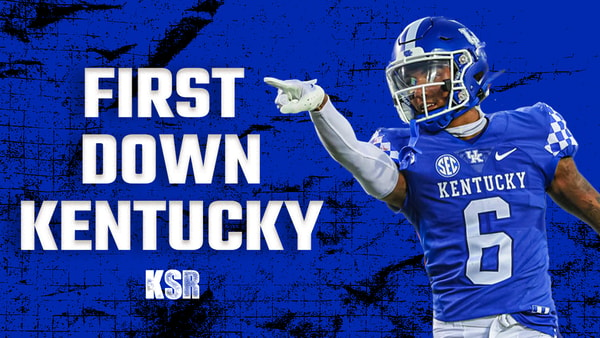
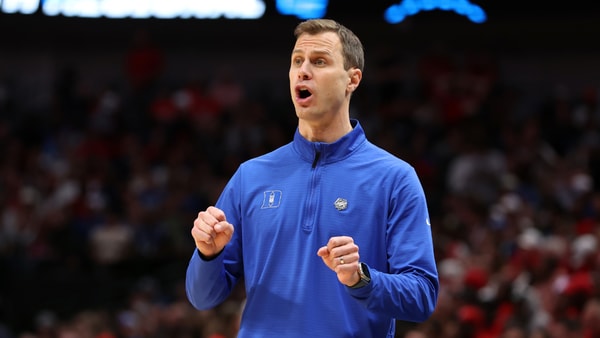
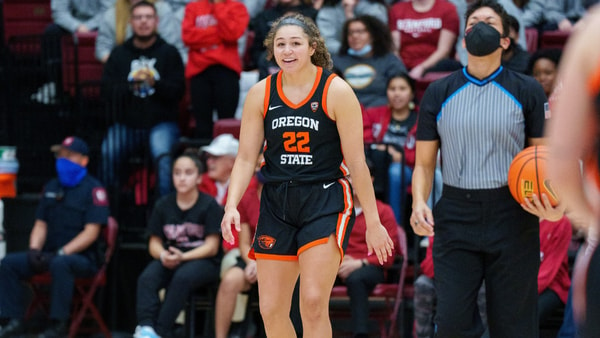
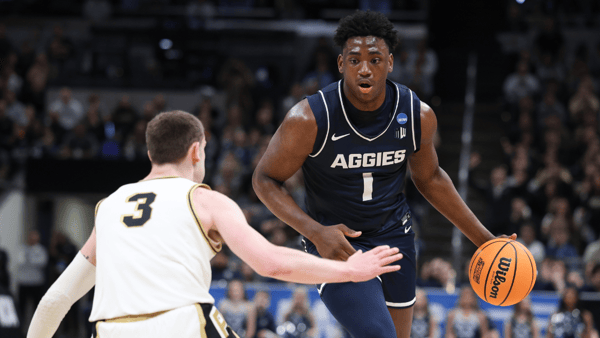
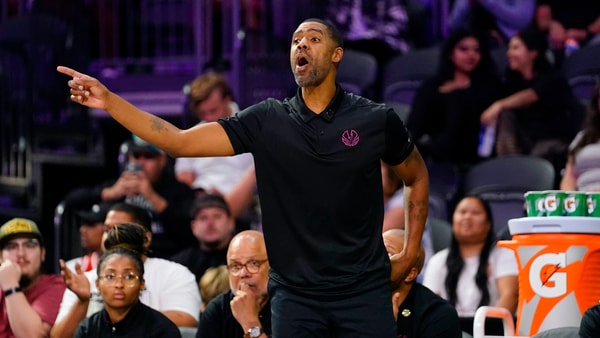
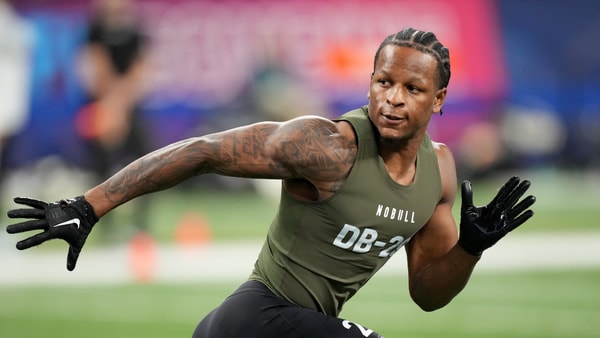
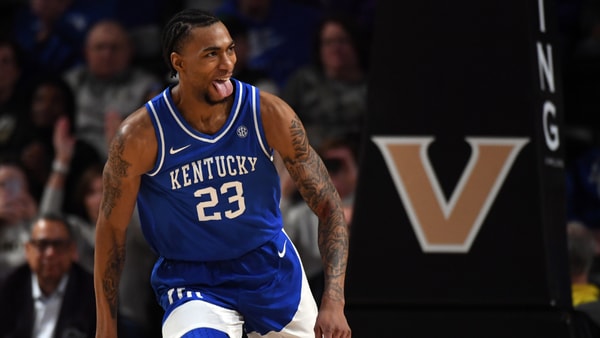
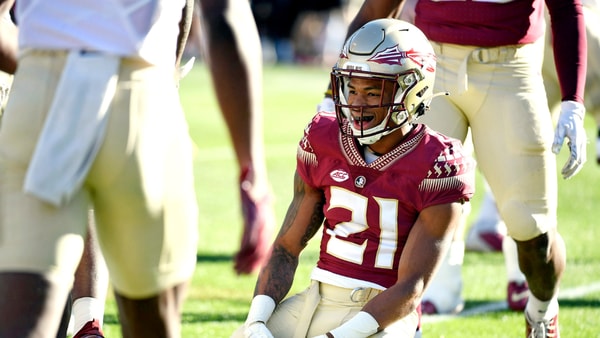
Discuss This Article
Comments have moved.
Join the conversation and talk about this article and all things Kentucky Sports in the new KSR Message Board.
KSBoard